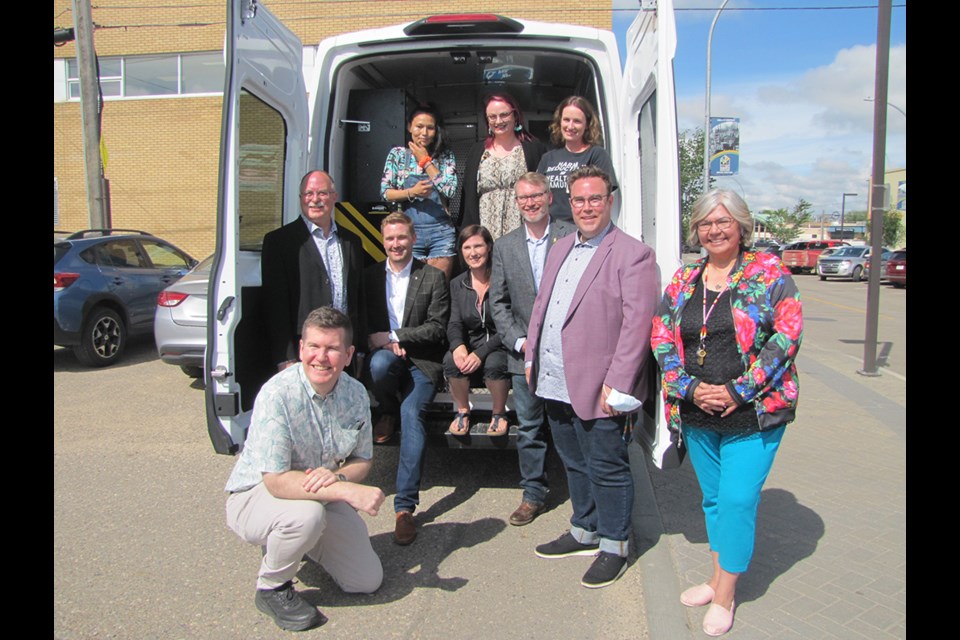NORTH BATTLEFORD — Thursday marked the official launch of the Mobile Harm Reduction Services Van which has recently begun to operate in the North Battleford area. It is the fourth in the province with others being in Regina, Saskatoon and Yorkton.
Everett Hindley, Saskatchewan’s Mental Health and Addiction, Seniors and Rural and Remote Health Minister was on hand for the event along with Jeremy Cockrill, MLA Battlefords and Minister of Highways, and Ryan Domotor, MLA Cut Knife-Turtleford.
Danielle Radchenko, Sexual Health Co-ordinator for Saskatchewan Health Authority (SHA) was a driving force behind the idea and design of the van. Her team included peer workers whose life experience added greatly to the efficient planning and implementation of the van.
Amanda Maunula, Outreach Worker for Battlefords Family Health Centre, noted that it all started with the number of new cases of HIV and syphilis in the winter of 2019.
“We had a hard time finding people. We started taking services to people as people were reluctant to come in for help.”
Now they offer services with the van twice a week, on Mondays from 11 a.m. until 2 p.m. and Thursdays from 3 to 6 p.m.. The van actually goes out more than that and they are very flexible with its use.
A big part of their job is in building relationships and trust, breaking down the stigma of seeking help. In doing that they connect people to wellness and communicable disease care.
They would like to be able to take it to smaller communities but, as always, staffing and funding are limiting factors.
The new all wheel drive van will be operating year-round, connecting to people in the right places. The van holds testing supplies, a snack cupboard, condoms, naloxone, referral papers and three capable staff members each time it goes out into the community. It is set up in such a way that one person can have total privacy while being tested in the back portion of the van while another is being given a snack in the middle section.
“We can’t do what we do without them,” claims Radchenko in speaking about the valued peer workers connected to the program. “They fill in where we need help, in clinic, crowd control, whatever we ask them to do.”
Their biggest asset is in reaching people they might not normally reach. People can be uncomfortable being tested. Coming into a clinic can be intimidating. That’s why the van is so useful in going into the community. People are more comfortable coming to the van than they are coming to a clinic.
“That’s the impact of meeting people where they’re at,” said Radchenko. “Community members stepping into the role of peers is huge in developing partnerships.”
She went on to explain that what starts with a health issue can lead to all around care, mental health support, nurses, wraparound support. “Follow up is a big support as well.”
In addition to the work in the community, they are also educating professionals and offering naloxone training for those who might need it.
“These mobile services are a critical component in the harm reduction response,” said Jeremy Cockrill, Battlefords MLA and Highways Minister. “Providing mobile harm reduction services is an important step as our government works to enhance addiction and overdose prevention supports for residents in our city and across the province.”
The Ministry of Health is investing a total of $470 million for mental health and addictions services in 2022-23. A part of the budget is dedicated to another mobile harm reduction services van that will be used in Prince Albert, plus three new community wellness buses that will travel to communities in south, central and northern Saskatchewan by the spring of 2023.
This story has been updated with more local information.




